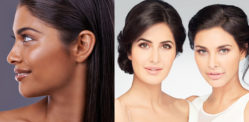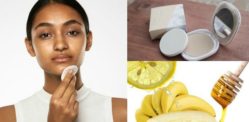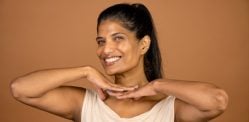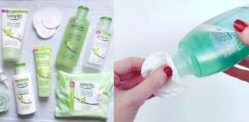Many skincare habits may lead to dehydration.
Well-hydrated skin looks plump, smooth and naturally radiant.
Much like a balloon filled with water which appears smooth and taut when filled, but sags when the water is taken out.
Hydration is raved about for not only its internal health benefits but external skin benefits as well.
The answer to why hydration is so necessary for skin health lies in the science behind the skin barrier.
The skin barrier or the outermost layer of our skin, also known as the epidermis, keeps water and nutrients in, and irritants and pathogens out.
The skin barrier performs these functions well when it is in a healthy state.
It does a good job at sealing in hydration by preventing/minimising transepidermal water loss.
Trans epidermal water loss (TEWL) is the passive diffusion/escape of water through the skin into the air.
If you often wake up in the morning with overly dry or tight, or even excessively oily skin, then you may be experiencing excessive transepidermal water loss (TEWL) overnight.
If you’re wondering why your skin is showing signs of premature ageing, it may be dehydrated.
Yes, your oily skin can be dehydrated too.
People with oily skin sometimes experience excessive oiliness along with skin dehydration, which causes frequent acne.
It’s important to understand the distinction between dehydrated skin.
Dehydrated skin isn’t synonymous with ‘overly dry’ skin, dehydrated skin is just skin that is lacking water.
Additionally, having oily skin doesn’t mean that your skin is hydrated.
Your skin can be oily and dehydrated at the same time.
Dehydration is a skin condition, rather than a skin type.
Any skin type can be dehydrated, whether it be oily, combination, or dry, and may manifest itself in different ways among different skin types.
Unlike dehydrated skin, dry skin lacks oil. Dehydrated skin is just skin lacking water.
When oily skin is dehydrated, it lacks water content, but may still produce oil.
It can over-produce oil to compensate for the lack of hydration, which is why dehydration in oily skin types can be misinterpreted as just excessive oiliness.
Additionally, those with acne-prone or oily skin are more likely to suffer from dehydration, as they often choose to use harsh products which can lead to dehydration.
When the skin is lacking water, it overcompensates by producing more oil.
Dehydrated skin is usually down to a combo of internal factors which include things or habits that damage the skin barrier.
The skin barrier gets affected by changes in the weather, lifestyle choices (excessive alcohol consumption/smoking, lack of sleep), diet, stress, sun damage etc.
Additionally, the skin also loses water and water-holding capacity as it ages.
With age, the skin loses hyaluronic acid along with collagen and elastin which contribute to a lack of volume, plumpness, and hydration.
Although age has a huge impact on skin hydration, it is important to remember that other factors may also contribute greatly.
If you’re not taking care of your skin when young, it can lose that youthful appearance.
Dehydrated Skin
 Keeping your skin well hydrated is the key to strengthening your epidermis and hence to an overall healthy-looking complexion.
Keeping your skin well hydrated is the key to strengthening your epidermis and hence to an overall healthy-looking complexion.
While drinking plenty of water daily and incorporating foods with high water content is great, it should be noted that skin is best hydrated topically.
You might be surprised to know that there’s a lack of data to prove that drinking water hydrates the skin.
There’s no doubt that water consumption is great for overall internal body hydration rather than skin hydration.
However, it is also true that severe dehydration can impact your skin health.
Skin experts argue that if your skin is dry then drinking water will not magically hydrate your skin.
Therefore, it’s a good idea to hydrate the skin topically rather than only relying on consuming water.
Despite no real connection between water consumption leading to skin hydration, we cannot deny that adequate hydration is important for an overall healthy body and lifestyle.
Dehydration is likely to show up on your skin, with dullness, sunken eyes, with perhaps more noticeable fine lines.
In contrast, well-hydrated skin doesn’t have any flaky texture and does not feel rough, tight or uncomfortable.
The pinch test can be a fair indicator of skin hydration.
When you pinch your skin and it settles back into place immediately, it is a sign of well-hydrated skin.
Therefore, a holistic approach must be taken i.e., keeping the skin hydrated topically, environmentally as well as internal means.
Taking care of your skin doesn’t always involve using tons of lotions, skincare can start from the inside out.
Consuming an anti-inflammatory diet, drinking plenty of water and getting adequate amounts of sleep can go a long way towards keeping your skin health in check.
Life would be much easier if you could just put water on your face to hydrate your skin.
It sounds counterintuitive but water on the surface of your skin can cause your skin to dry out because as it evaporates, it takes the skin’s beloved oils with it.
The drier the air, the more quickly the evaporation process will occur.
After washing your face with a face wash, evaporation begins to occur within the seconds your skin is still damp, so it’s important to hydrate as well as seal that hydration in.
This can be done by using a humectant, which is a hydrating agent, followed by an emollient or occlusive product to seal it in.
Humectant Ingredients
 A humectant is a substance that keeps the skin hydrated, which may be derived from natural sources, such as honey and aloe vera, or synthesised from other sources to create ingredients like glycerin and propylene glycol.
A humectant is a substance that keeps the skin hydrated, which may be derived from natural sources, such as honey and aloe vera, or synthesised from other sources to create ingredients like glycerin and propylene glycol.
When we talk about skin hydration, hyaluronic acid is the ingredient that first comes to mind.
Hyaluronic acid is a naturally occurring substance in our body.
It is important because it’s a humectant, which works by attracting water and pulling it deeper into the skin to add moisture to the skin barrier.
While hyaluronic acid is called an acid, it is a sugar and does not provide exfoliating effects.
Like hyaluronic acid, our skin already contains urea and lactic acid as part of natural moisturising factors.
Urea and lactic acid have hydrating properties plus the ability to help remove excess dead skin cells.
Incorporating humectants in your routine by using a hydrating toner, an essence or a serum can work best to ramp up your skin’s hydration levels.
K-beauty toners and essences are top-of-the-game when it comes to delivering hydration.
Some highly-recommended hydrating products include the Pyunkang Yul Essence Toner, Laneige Cream Skin Refiner, Benton Aloe BHA Skin Toner and COSRX Advanced Snail 96 Mucin Power Essence.
All humectant ingredients mentioned besides lactic acid should always be applied on damp skin to increase their efficacy.
Always Use a Moisturiser
 After using a humectant product, it’s important to seal it in.
After using a humectant product, it’s important to seal it in.
Using a moisturiser is recommended for all skin types, even for oily and acne-prone skin.
It’s important to note that the basic function of a moisturiser is to seal in hydration and prevent trans epidermal water loss in both skin types.
Therefore, occlusives are an ingredient category to look out for in moisturisers.
Some great occlusive ingredients to look out for include shea butter, caprylic/capric triglyceride, dimethicone, squalene, glyceryl stearate SE, and mineral oil.
An ideal moisturiser should contain ingredients that help reduce trans epidermal water loss by creating an occlusive layer over the skin and strengthening the skin barrier.
Ceramides are naturally occurring lipids (fats) in the skin that essentially act as the glue that holds our skin cells together to keep our skin barrier intact and healthy.
Niacinamide is the much-raved skincare ingredient that may help calm your skin, reduce trans epidermal water loss (TEWL), and increase moisture in your skin’s uppermost layer.
Additionally, it also has skin-brightening and oil-balancing benefits.
Some recommendations for moisturisers include the CeraVe Daily Moisturizing Lotion, Neutrogena Hydro Boost Gel Cream, Simple Hydrating Light Moisturiser and Cetaphil Derma Control Oil Absorbing Moisturizer SPF 30, La Roche Posay Effaclar Mattifying Moisturizer, and the First Aid Beauty Ultra-Repair Cream.
Eat Foods high in Water Content
 While drinking plenty of water is certainly recommended, adding fresh fruits and vegetables to the mix can certainly help boost your hydration levels.
While drinking plenty of water is certainly recommended, adding fresh fruits and vegetables to the mix can certainly help boost your hydration levels.
Many fruits and vegetables are high in water content as well as vitamins, minerals and antioxidants which help your skin to be healthy overall.
As mentioned earlier, you need a holistic approach for healthy and glowing skin, and diet plays a huge role in that approach.
Foods rich in water as well as nutrients, such as cucumbers, celery, zucchini, strawberries, grapes, citrus fruits, and melons, can be incorporated into your diet in lots of ways.
Additionally, incorporating foods that provide a healthy dose of essential fatty acids can also go a long way in keeping hydration needs in check-as proven by studies.
Essential fatty acids or omega fatty acids are not produced by the body and hence need to be consumed through diet.
Foods like avocados, fish like salmon and tuna, nuts and seeds are great sources of essential fatty acids, most notably flax seeds, pumpkin seeds, walnuts and almonds.
A well-balanced diet full of antioxidants and essential fatty acids helps provide the necessary building blocks for healthy skin cell function.
Avoid Habits that Dehydrate the Skin
 As alcohol, caffeine, soda, or sugar-sweetened beverages can dehydrate the skin, it’s best to limit their consumption for the health of your skin.
As alcohol, caffeine, soda, or sugar-sweetened beverages can dehydrate the skin, it’s best to limit their consumption for the health of your skin.
In contrast, foods rich in hyaluronic acid are often encouraged as they may boost your skin’s natural hyaluronic acid levels.
Such foods include bone broth, soy-based foods like tofu, starchy vegetables like sweet potatoes, citrus fruits, leafy greens and seeds such as pumpkin and chia seeds.
Many skincare habits may lead to dehydration, such as using strong active ingredients too much and too often.
Active ingredients like retinol and AHAs & BHAs etc are not meant for daily use.
Additionally, harsh cleansers may disrupt the skin barrier, so steer clear of skincare products that contain drying alcohol like ethanol.
Avoiding hot showers, and investing in a humidifier can also go a long way to prevent skin dehydration.
All skin needs to be well hydrated, and well-hydrated skin can be achieved through a holistic approach that focuses both on hydration from the inside out as well as topically.






























































